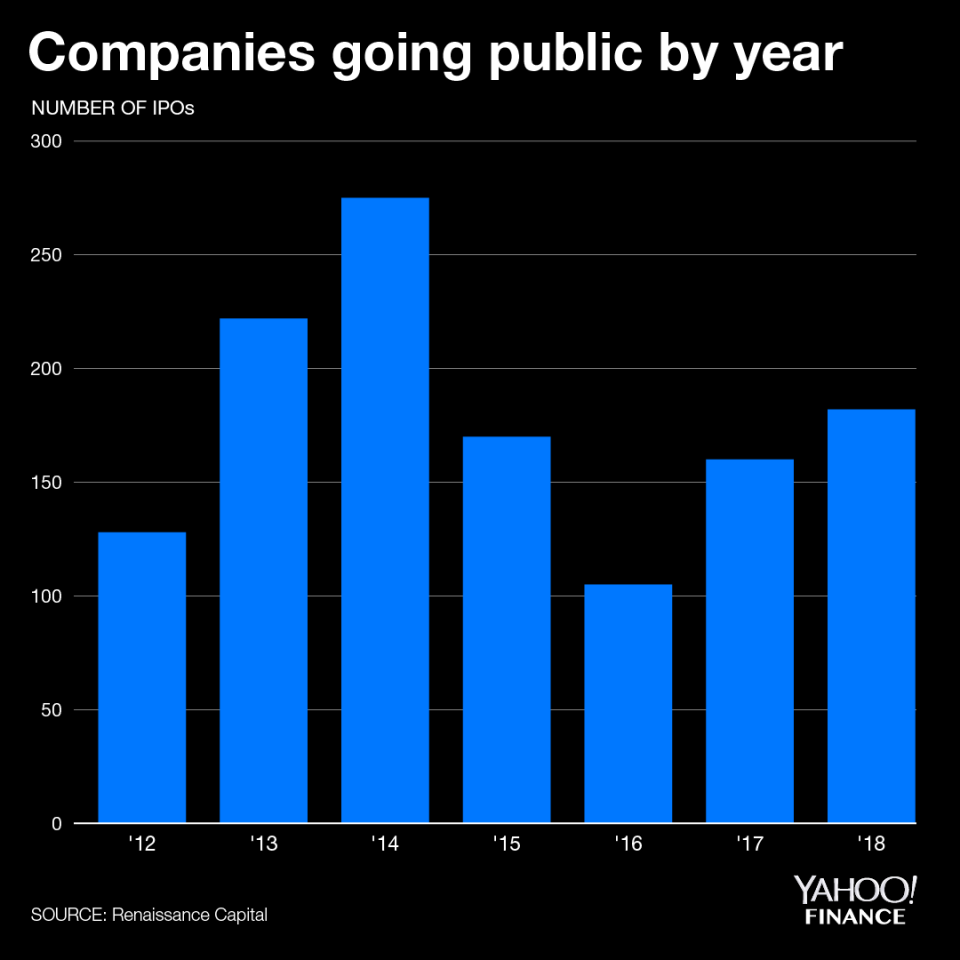Why 2019's IPO outlook is bleaker than it should be
In 2018, tech unicorns Spotify (SPOT), Docusign (DOCU) and Dropbox (DBX) headlined the initial public offering lineup that amounted to the highest annual number of IPOs seen in the past four years.
But outside of the big-banner tech names like Uber or Lyft that are expected to go public next year, companies are pausing as fewer private companies actually take the plunge.
“We should be seeing two to three times the number of IPOs we’ve been seeing,” Duncan Davidson, co-founder and general partner at venture firm Bullpen Capital, told Yahoo Finance. “Some marquis names will try to get out in 2019, but I think the headline might be more IPOs slipping into 2020 as opposed to coming in 2019.”

One of the main reasons investors like Davidson cite for the delay in companies turning to public funding has been the rise of readily available capital in private markets. From 2014 to 2018, the average venture capital fund size in the U.S. swelled from $161 million to $283 million. Perhaps no fund has become more emblematic of that trend than SoftBank’s $100 billion Vision Fund, which has been scooping up startups around the world in funding rounds that commonly top $100 million.
“You could say we’ve gone from a ‘public IPO’ to a ‘private IPO’ market with these huge venture capital rounds,” Davidson said. “That trend isn’t going anywhere, I think it’s going to get worse.”
That phenomenon might lead to some historically large IPOs in 2019. Uber, for example, is reportedly weighing going public at a valuation of around $120 billion in what could be the largest public offering in history, possibly eclipsing the current record set by Alibaba’s $25 billion IPO in 2014. At that valuation, Uber would need to offer up 21% of the company to steal the title, compared to the 15% of shares outstanding Alibaba (BABA) offered when it listed on the New York Stock Exchange.
Tech firms issuing fewer shares
However, among the tech companies that have gone public so far in 2018 most have decided to issue fewer shares despite public investors clamoring for opportunities to get into high-growth names. According to deal tracking firm Dealogic, tech companies through 2018 have offered the lowest public float historically recorded since Dealogic began tracking the stat in 1995, with an average of just 17% of shares being listed in IPOs.
That trend might be something to watch heading into 2019 as more tech companies like cybersecurity firms Cloudflare and Cloudstrike, or consumer names like Pinterest and Slack, eye possible IPOs.
A low public float is often positively correlated with increased volatility following an IPO. Indeed, it’s one of the reasons often cited for the wild price swings witnessed in shares of marijuana company Tilray (TLRY) after it went public in July. Should negative market sentiment return on a scale similar to what unfolded in October as the Nasdaq dipped 9%, newer publicly traded companies with low floats could be hit hardest. In the five years since 1995 when new public companies notched negative annual returns, companies who only listed 0-20% of shares averaged an annual loss of 21% compared to the average loss of 15% posted by all new public companies, according to Dealogic data. That said, companies offering a smaller proportion of themselves in IPOs also enjoyed the greatest gains in up years.

Many companies that go public don’t even make money
Of course, float is not the only factor behind why shares in newly minted public companies might be more volatile. Many companies pursuing an IPO tend to be smaller or unproven names, and as University of Florida finance professor Jay Ritter has researched, a growing percentage aren’t even profitable. About 81% of U.S.-listed companies going public in 2018 through mid-November lost money in the year leading up to their respective IPOs. That matches the highest percentage he’s ever recorded — the same proportion of unprofitable companies went public in 2000 as the dot-com bubble came to an end.

Event company Eventbrite (EB) was one of those companies that went public in 2018 without posting a pre-IPO quarterly profit. Nonetheless, shares were priced higher than initially expected after the price range was revised higher from $19 to $21 a share to $21 to $23 a share. The company enjoyed a 60% pop on its first day of trading.
But not too much weight should be placed on money-losing companies going public, according to Atish Davda, co-founder of EquityZen, a platform for buying and selling private company shares that’s worked with one out of every three unicorns. After all, Amazon (AMZN) was once also a profitless startup going through the IPO process.
“Amazon went public in 1997 in its fourth year of operations, had $16 million in revenue and a market cap of just $440 million, but it was growing so quickly,” he said. “Yes, [some companies] are unprofitable at large numbers, but sometimes that’s required to sustain incredible growth.”
So long as the market continues to be receptive toward such companies, Davda foresees a strong IPO market in 2019, that with the help of names like Uber, Lyft and potentially even Airbnb or Palantir, could notch the highest funding amounts seen in the last five years.
“It won’t be in count, but it will be in value,” he said.
Zack Guzman is a senior writer and on-air reporter covering entrepreneurship, startups, and breaking news at Yahoo Finance. Follow him on Twitter @zGuz.
Read more:
Where SoftBank’s Vision Fund is deploying its $100 billion
How Juul became the FDA’s latest target
Juul surpasses Facebook as fastest startup to reach decacorn status